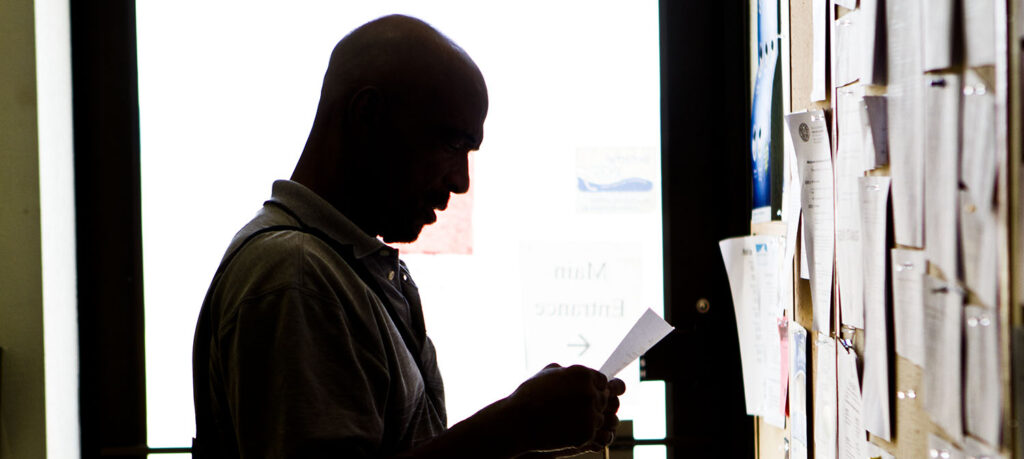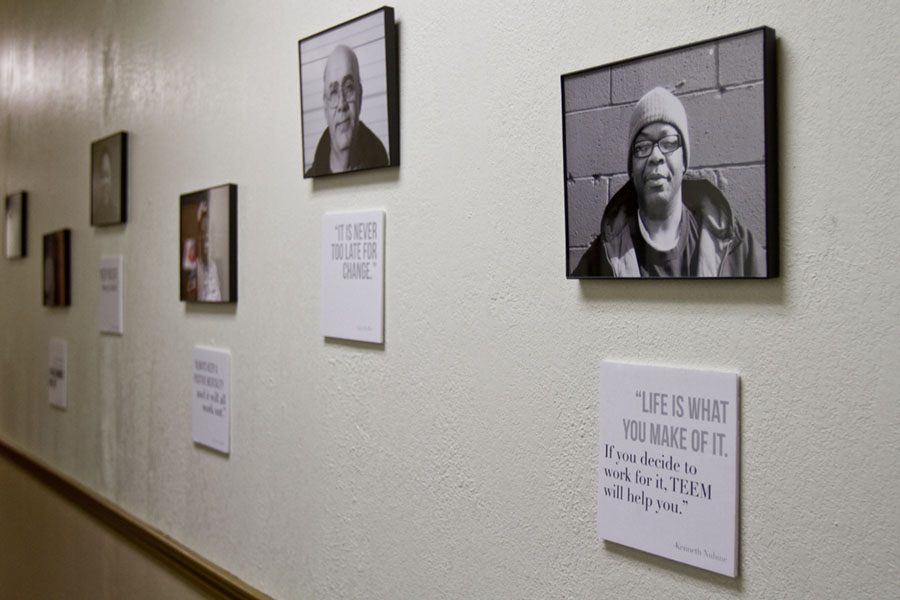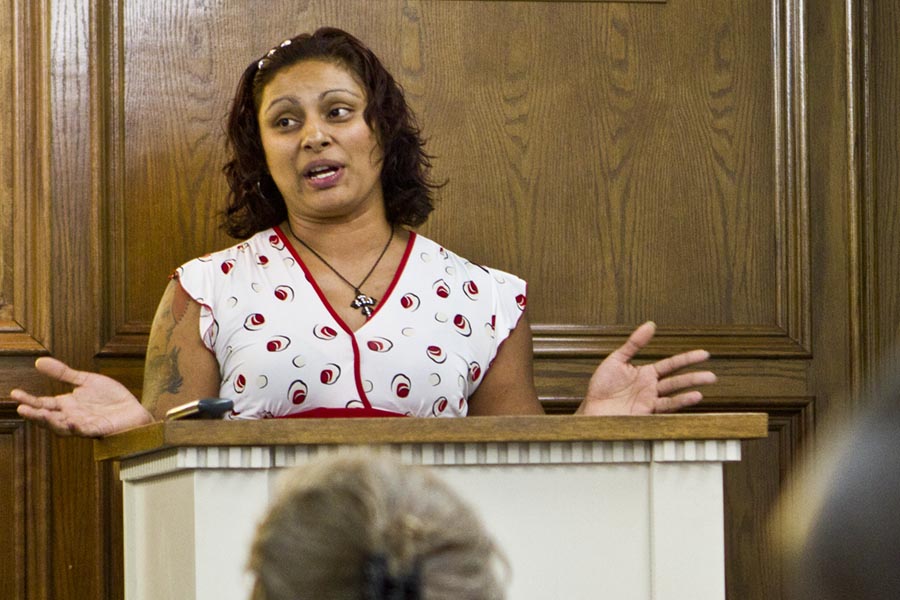

By Jessica Willingham
Some people get there by bike. Some get there using a free bus pass issued to them by the prison upon their release. Some borrow a ride from a friend or stranger. Still others walk from their makeshift bed – a park bench.
Their destination stands just past the Mercedes dealership, where the buildings quickly morph into dilapidated warehouses and abandoned businesses with windows as tired and empty as the eyes of those standing outside them.
On the other side of the tracks, headed toward the east side of Oklahoma City, The Education and Employment Ministry (TEEM) would seem as hopeless a cause as the people who shuffle through its doors. Yet not everything is always as it seems.
At least, that’s what Brent Berry learned. An accomplished Oklahoma City attorney, he dropped off a box of old suits to TEEM‘s headquarters when his law firm was participating in the drive for charity. The man taking his boxes was tattooed and clearly down and out. “I didn’t have high expectations of the people at TEEM,” Berry confessed. “I admit I immediately passed judgment on the people here.” Despite outward appearances, Berry found the man assisting him with his boxes to be polite, helpful and proud of his work. In fact, each of TEEM‘s 18-member staff impressed Berry to the point he truly wanted to understand the organization’s mission.

Of those who show up at TEEM‘s door, nearly 50 percent are recently released from prison. “A lot of people think that when you get released from incarceration, the Department of Corrections has properly prepared you to re-enter the workforce,” said Sarah Blaney, TEEM Development Coordinator. “The truth is, all you get is $50 and a bus pass.”
Another large portion of TEEM students – 31 percent – are homeless, and the majority suffer from addiction and generational poverty. They all come from different situations and walk through the door with one objective: meaningful employment.
“The more time I spent with TEEM, the more my impressions changed,” Berry said. “The staff and students carry themselves with a strong sense of importance. The services TEEM provides are vital because it’s about survival. They’re giving others the tools to succeed and be self-sufficient. I have been, and continue to be, blown away by the people here.”
Berry is now a board member and active volunteer with TEEM.

Like Berry, The Samuel Roberts Noble Foundation also came to believe in TEEM and its cause. In 1991, the Foundation began a relationship with the nonprofit that has resulted in 27 grants and more than $470,000 dollars in support.
“The stories of TEEM students and their successes are remarkable,” said Mary Kate Wilson, director of granting at the Noble Foundation. “The Foundation wanted to be a part of continuing that success. Our relationship has been a consistent one because the trustees truly believe in the work TEEM is doing – giving people a hand up, not out.”
TEEM receives funding from individual donations, but a large majority – 60 percent – comes from private institutions like the Noble Foundation. “The impact Noble has on TEEM and its services is hard to quantify. It’s our lifeblood,” Blaney said. “Most organizations want to support programs specifically, such as bus passes or meals. We need those, too, but the most difficult dollars to raise are general operating funds. People don’t want to pay to keep the lights on, the building open or make sure you have a receptionist. That’s not the glamorous stuff people want to give to, but it’s what allows TEEM to keep running efficiently so we can impact the world in the way we want to impact it.”
Keeping the lights on has ensured TEEM‘s assistance to more than 12,000 people since its inception. Yet, as the economy continues to suffer, TEEM‘s need in Oklahoma City grows and puts a strain on staff and resources. As usual, they face opposition with optimism and the help of the Noble Foundation, other generous organizations and people like Brent Berry, who are willing to give their time and faith.

Thirty-eight percent of TEEM‘s staff are former participants in the programs.
“Many people are anxious to get jobs, but simply aren’t ready,” said LaNeeta Bradley, a former student who is now employed as a job coach by the organization. “By the time they get here, their self-esteem is down so low they have a fear of interviewing. We help build that self-esteem and identify values and goals. By the time they complete the class, the anxiety is gone and they’re prepared for the interview.” Of those who complete Bradley’s class, 98 percent gain meaningful employment. Bradley continues to mentor each student through their first year back in the workforce.
TEEM reaches beyond the efforts to secure meaningful work and offers additional support through social services. “If life isn’t working in the home, it’s not working anywhere,” said Rev. Tony Zahn, former attorney and current executive director of TEEM. “A person who goes through TEEM receives help with finding treatment, housing and other parts of their lives that we don’t directly handle. We try to help them in every area, to improve their whole lives.”
Transportation, child care and various rehabilitation centers are all available to students through TEEM. Two meals are served a day at the headquarters, made possible by the Regional Food Bank and grocery store donations. TEEM‘s kitchen manager, a former student, cut the organization’s food costs by 25 percent after being given a chance at employment. Doing more with less isn’t something new for TEEM and its students and staff.
To help support its many activities, the nonprofit hosts a series of drives to restock its clothing closet and hygiene items.

It’s Friday afternoon, and light streams through the glass windows of TEEM‘s chapel, dancing as people shuffle past and take their seats in the pews. Many students are wearing suits and pride for the first time. It’s graduation day. They each take their turn, speaking words of encouragement to their classmates and words of gratitude to TEEM. As the final speaker concludes, the chapel stands with an emotional and powerful ovation. In the very back stands Berry, clapping with admiration for the graduates who have defied all odds, even the ones they placed on themselves. Whatever shadows loom in people’s lives, TEEM is a place to turn expectations and perceptions around, Berry knows all too well.

TEEM began in 1987 with the intention of assisting men overcome alcohol addiction. Since then, the interfaith nonprofit ministry has expanded its reach to people of all genders and backgrounds in need of assistance in gaining, or often regaining, independence. TEEM has a three-pronged approach to meeting this goal: education, employment and social services.
Every Monday, desperate, yet determined, individuals line up outside TEEM‘s door. The first 15 are accepted into Career Development Workshop, the preliminary class for those seeking to improve their life through TEEM. In the weeklong class, they become oriented with the organization, the services it provides and the skills they need to develop. Upon graduation, students can enroll in other classes to expand their skill set and marketability to employers, such as GED classes and those that focus on character, communication in the workplace, and personal life management and navigation; and various trade and training certifications.
Stay up to date on all the ways the Noble Foundation is helping address agricultural challenges and supporting causes that cultivate good health, support education and build stronger communities.